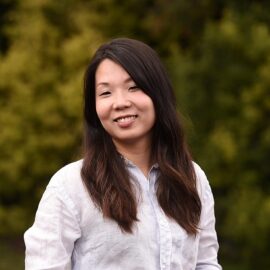How my story begins: It was the end of 2020 during COVID, and I took the annual health check in the U.S. for the first time. My pap came back abnormal with the positive result of the HPV test. I remember I had abnormal paps from time to time in Japan, but every time I re-did the tests, it came back normal. The doctors told me it was nothing to worry about and suggested I take the pap test yearly. I never missed it, which saved my life, but it didn't prevent me from having cancer.
Life before my diagnosis: I was born and raised in Japan. I came to the U.S. at the age of 27 for work.
How I felt after diagnosis: It was entirely out of the blue as I had no symptoms I was aware of then. I regretted my ignorance and wish I could have known better when I had the abnormal pap test results.
My treatment: We hoped to have a hysterectomy only and be done with the treatment. However, my doctor decided that I should get radiation after the surgery. I kept my ovaries and had them transported out of the radiation site. Even though I only had one month between the diagnosis and the surgery, I was able to have an IVF cycle right before the surgery.
What was most difficult for me: Having to deal with cancer during the pandemic was hard. The waiting time to get scheduled was longer. I had to wait a few weeks to see a specialist after being told I had cancer. I had a difficult time sleeping, and working full-time remotely from home. I had to go to the doctor's office alone. No one could visit me at the hospital after the surgery. There were so many uncertain things that were all new to everyone.
What I did to help myself: I accepted all the help I could get. My husband helped me look for a therapist to whom I could talk. Some friends offered us meals and gifts, helped take care of our house, and gave us rides to the hospital. My mom flew all the way from Japan to take care of me. My managers and the HR department were very generous and supportive, allowing me to take leaves and work flexibly.
My life after cancer: I am still adapting to my "new norm." My doctor told me that radiation is like climbing a mountain. As you progress, the damage in your body accumulates. I have some long-term side effects that I have to deal with, especially urination and bowel movements. Also, I am learning to cope with the anxiety of recurrence with help from my therapist.
Where I am today: I am proud to say that I am in a happy place. I care more about things that are important to me and less about things that are not important. I got stronger. My bond with my people got stronger.
What I want other women to know: Please get informed. Take care of yourself and your loved one. Do not miss cancer screenings.
How I will try to help others: I tell my story to prevent someone from having this terrible experience. There still are stigmas and misunderstandings around cervical cancer and HPV. Especially in my culture, we don't talk about these things. Cervivor taught me how important it is to raise your voice and advocate for yourself and the community you care about.
